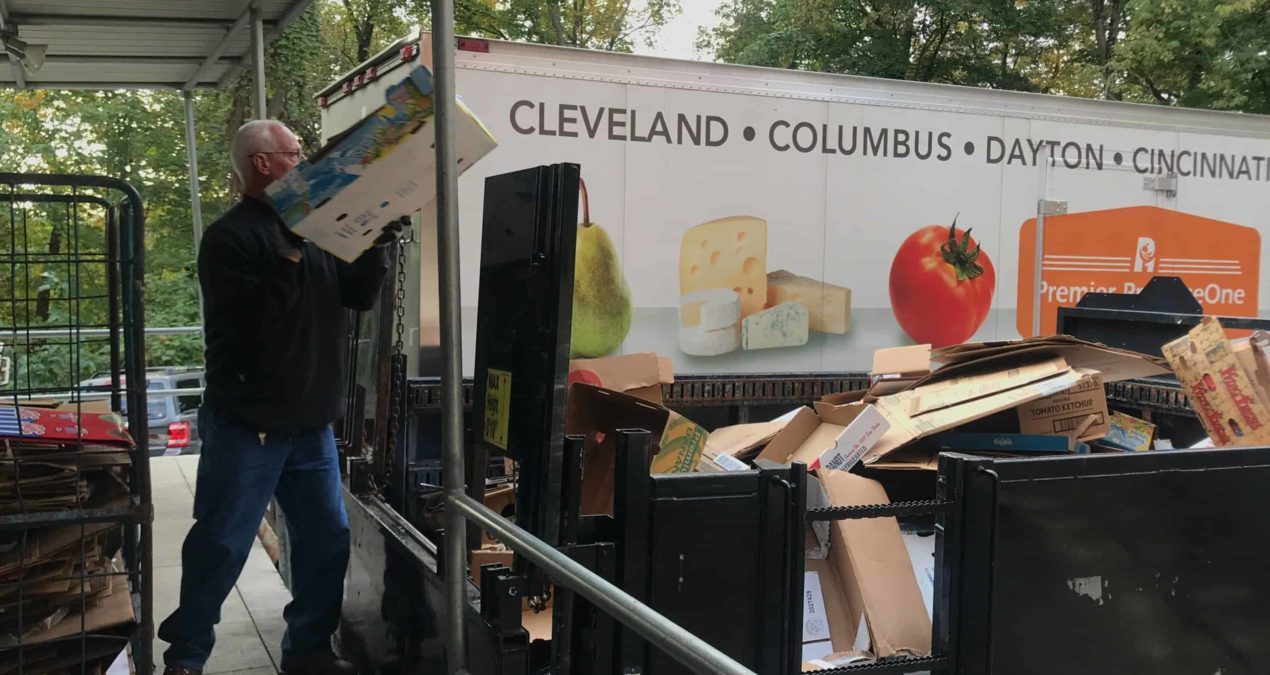
ALINA PANEK, News Editor—All of the trash on Denison’s campus is picked up by one man, Scott Barrett, a groundskeeper but Denison’s solo Trash & Recycle Operator. He makes 20 to 30 stops a day all around campus daily to make sure that the campus stays safe and clean.
Barrett has two trucks that he’s allowed to pick up the garbage and recycling. He often uses the garbage truck to pick up both the garbage and recycling. “No one ever asks to borrow my garbage truck,” Barrett laughs. “But you’re welcome to ride with me, the carriage is where it’s the cleanest; That’s my office. It even has bluetooth now!”
In early part of 2018, Barrett was given the opportunity to shop for a new garbage truck. Michael Supp, the Assistant Director Operations of Facility services, told me that the truck cost about $130,000.
“It was a good investment,” Supp said. “It was costing more the repair the old truck.”
Supp says that a common misconception among students is that we do not recycle at Denison. Community members will often be confused when they see the same truck picking up the garbage circle around again to pick up the recycling.
In early 2019, students noticed this difference when a shiny white new truck with the Denison name emblazoned on the sides. But when students started seeing the truck pick up both the recycling and garbage Dumpsters, the rumor started around campus that Denison was no longer recycling.
This rumor is damaging for Denison recycling, if Dumpsters are too contaminated then they cannot be collected, causing others hard work of separating materials all for naught. At Denison, the Dumpsters that are most frequently thrown out due to contamination is by the residence halls, which are more than half of the collection Dumpsters. Since it was rejected, there was no other place to put it and the garbage collection agency took the waste away to sit at a landfill. It is a reality that not many realize after dropping their waste in the bin.
“We need to do better,” Barrett said. “We’re never going to be perfect.” He encourages the community to consider recycling to be an important task.
Not many students may realize, but recycling comes at a cost. According to Supp, on an average academic school year, Denison spent about $103,000 on recycling efforts last year. Supp, a recently made father to an infant, sees this investment as a moral obligation that Denison needs to invest in for the hope of future generations. He noted the feeling of lost and hopelessness when one does not see recycling on campus.
Jeremy King ‘97, Director of Sustainability and Campus Improvement for Denison since 2009. For his role, he constantly plans and strategizes for energy efficacy, promoting solar energy, encouraging sustainable dining and growing, community outreach and what King calls his most challenging task: recycling. Some of his most successful projects include planning a two megawatt solar array, which will generate 15% of the college’s energy and significantly reduce its carbon footprint, reduced electricity consumption by 19%, for an annual savings of $250,000, reduced campus waste by over 100 tons in last five years and increased local food consumption from 15% to 41%.
King has tried many different strategies to help promote the correct method of recycling. One tactic that has been tried recently was installing lids on the recycling Dumpsters at the residential halls. It helps the students distinguish the Dumpsters in addition to the contrast in color. His entire Denison career has always been portionally dedicated to promoting participation and decreasing contamination in recycling.
Environmental advocacy is growing within the young generation of high schoolers within the U. Without student passion driving sustainability efforts, King tries to make sustainability as accessible and intuitive as possible for community members, facilitating this by meeting with local leaders.
King and Supp met with Andrea Krava, director of the Licking County Department of Recycling and Litter Prevention on community recycling in October. At the meeting they explained their sustainability struggles including that Denison has high levels of contamination in their recycling dumpsters. In response to her surprise, Krava said, “It is shocking and disappointing that high class, educated people cannot figure out how to recycle.”
“We’re [as a campus] trying to move the needle on sustainability since we’re out of weeds here,” King said. “There are so many great opportunities, but the more challenging decisions that emerge can be frustrating. Denison University is a great place of engagement but it seems like students don’t care about sustainability. It’s hard for the community.”
King reassured that not everything is bleak when it comes to Denison’s position in sustainability.
“Denison is one of the leading colleges,” King said. “This frustration is one that everyone is having. You can ask any other sustainability coordinator.”

